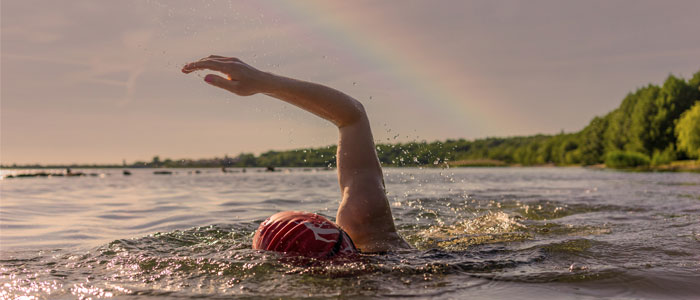The Benefits of Wild Swimming
16th Aug 22

Swimming is one of the best forms of exercise you can do. It works the whole body, it is low impact, and it is very accessible, no matter your age, circumstances or experience level. Couple this with fresh air and the great outdoors, and you’re onto a real winner. Enter: wild swimming!
Want to move fast? Jump to the right section below:
- What is wild swimming?
- The physical health benefits of wild swimming
- The mental health benefits of wild swimming
- How to stay safe when swimming in open water
What is wild swimming?

Wild swimming, or open water swimming, is simply swimming in a natural pool of water. This could be the sea, a lake, a loch, a pond or a river. The water may be fresh or salty, still or choppy, and, depending on the time of year, it could be a refreshing dip or an incredibly chilly one.
Wild swimming has always been a common occurrence in other countries, where diving into a lake, splashing in the sea, or even jumping into a fjord after a sauna is part of daily life. However, swimming in open water has only recently seen a surge in popularity in the UK. Perhaps wildness and freedom is exactly what we need at this moment in time? Not only does wild swimming provide us with a break from the stress and uncertainty of the world right now, but it is the perfect antidote to the isolation of the pandemic and the lockdowns that only allowed us one outing a day.
No matter when or where you choose for wild swimming, you’re sure to emerge energised, reconnected to nature, and with an all-round boosted mood.
“I really enjoy the peace and quiet and looking at the scenery,” explains wild swimmer Nicki, who started open water swimming around six weeks ago. “It’s much better swimming in a lake. Pool swimming is monotonous, and to swim any distance seems like a chore, but with open swimming, I can swim much further and don’t feel bored.”
The physical health benefits of wild swimming

Wild swimming offers many physical benefits, including:
- Improving cardiovascular fitness
- Building stamina
- Strengthening muscles throughout the body
- Helping to achieve or maintain a healthy weight
- Reducing muscle soreness and aiding recovery
- Improving flexibility, coordination and posture
On top of these, wild swimming has the additional advantages of:
- Reducing body pain and inflammation
- Boosting the immune system
- Improving circulation
- Potential to reduce blood pressure and cholesterol
- Boosting brain power
The mental health benefits of wild swimming

And the health benefits don’t end there. Swimming in open water releases endorphins and helps us to cope with anxiety and stress. It also increases alertness and brings a better sense of clarity, along with providing an incredible sense of achievement. Research from the British Medical Journal has even found that regular wild swims have similar outcomes to antidepressants.
Cold water therapy has been utilised for thousands of years, with the Ancient Greeks using different water temperatures to heal a variety of ailments. But it’s only recently that we’ve really started to appreciate the mental health benefits of swimming outdoors.
“I feel so much better after a swim,” Nicki tells us. “I am clearer in the mind, calmer, and I sleep better.”
Another huge advantage is the social interaction it offers. There are many groups around the UK that offer organised dips – discover the community here. At the same time, if you’re hoping for some peace, quiet and ‘you’ time, going for a wild swim is the perfect tonic, although if you’re a beginner, it’s always much safer to take a buddy with you.
This is exactly what Nicki did: “My neighbour first invited me as she is going to Finland and will be swimming in lakes, but she isn’t a confident swimmer,” Nicki explains. By taking their first dips together during warmer temperatures, Nicki and her friend have safely familiarised themselves with open water swimming. So what else needs to be considered in terms of health and safety?
How to stay safe when swimming in open water

- Don’t jump in at the deep end! Start slow, going in for just two or three minutes, to begin with, and staying close to the shoreline while you build up your confidence, strength and stamina.
- Always check that the water is clean and free from dangerous algae and bacteria. If there’s any doubt in your mind about the water quality, avoid this water and choose another spot.
- Identify your exit point before you get in. If you’re not able to get out safely, don’t get in!
- Check the water temperature before diving in. Take it slow, submerging yourself gradually. Remember that deep water is always colder than the shallows, so bear that in mind if you venture further out.
- If you’re swimming in the sea, get to know the tides and currents. It’s always safer to opt for an area with lifeguards. If you want to swim in a river, remember that water travels faster where it’s narrow or shallow. And if it’s a windy day, remember that this can affect the water.
- Trust your instincts. If something doesn’t look or feel right, get yourself to safety.
- Wear the correct attire. You should wear something bright or take a tow float so that you’re visible in the water. Swim shoes will help to protect your feet and keep you from sliding on slippy rocks. A wet suit is always a good idea if it’s cold, along with a brightly coloured woolly hat.
- Have the right stuff ready at the end of your swim. This includes a towel, a hot drink and a snack to help you warm up and give you an energy boost – wild swimming is hungry work, after all!
It’s the magic of cold water, fresh air and natural surroundings that make wild swimming such a supercharged form of exercise. “It just feels different to swim in open water,” says Nicki. “For a start, there’s no stinky chlorine smell. And every swim is different; if it’s a windy day, then it can get a bit choppy. But if it’s hot, it’s the best place to be because the water cools you down.”
Are you ready to take your first dip? Be sure to let us know over on Instagram and Facebook!

Before beginning any exercise or nutrition program, consult your physician, doctor or other professional. This is especially important for individuals over the age of 35 or persons with pre-existing health problems. Exercise.co.uk assumes no responsibility for personal injury or property damage sustained using our advice.
If you experience dizziness, nausea, chest pain, or any other abnormal symptoms, stop the workout at once and consult a physician or doctor immediately.









